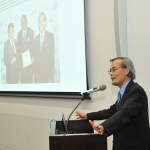
“Summary” report on the Forum on Global Inter-city Collaboration for SE4All
Background
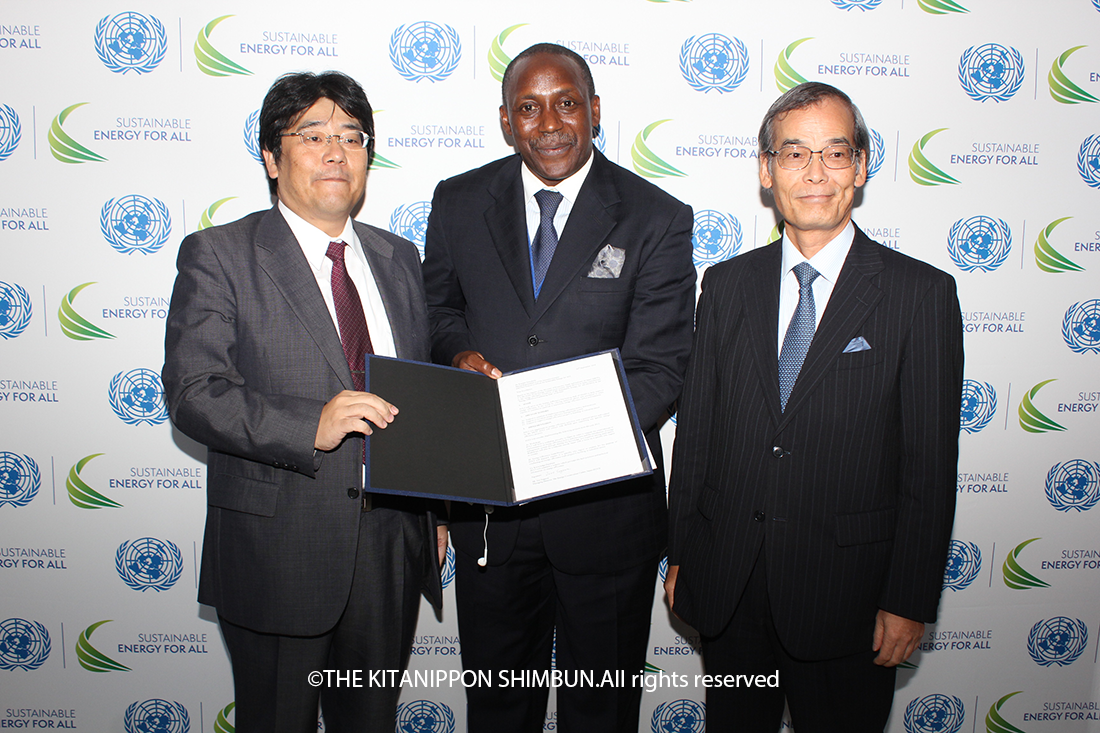
After the two oil crises, Japan has worked on improvements in energy efficiency through the efforts provided by public and private sectors, and is currently one of the top-class highly energy-efficient countries in the world. In addition, over the past 30 years, the country has practiced various approaches, through The Energy Conservation Center, Japan (ECCJ), mostly in Asian countries that experience remarkable economic growth. They include the efforts toward development of energy conservation policies and legal systems as well as implementing and spreading energy-conservation technologies in such countries. To extend the knowledge and approaches through the activities for the Sustainable Energy for All (SE4All) initiative, Prime Minister Abe declared, during his speech at the United Nations (UN) Climate Summit held in September 2014, that Japan would establish an international hub for energy savings in Tokyo. In light of the commitment, ECCJ delivered its Letter of Intent to assume the role of the international hub to the SE4All initiative. Accordingly, the center, as the Energy Efficiency Facilitating Hub, became a part of the hubs for five subjects under the UN SE4All initiative.
As the first event of activities to be implemented by hub for SE4All, ECCJ organized the Forum on Global Inter-city Collaboration, where energy policymakers and specialists in Asian, Central and South American, and African countries as well as Japan got together to discuss energy conservation in cities. Meanwhile, the city of Toyama, which is the only city in Japan that participated in the SE4All initiative as a Global Energy Efficiency Accelerator Platform, also held a SE4All forum (Toyama version).
Objectives
According to International Energy Agency (IEA), two thirds of total energy in the world are consumed by cities. With the expected advancement of urbanization in the world in near future, it is anticipated that the consumption by cities will account for three fourths of the total energy by the year 2030. In view of the above, the progress in the energy conservation in cities is the main focus among the global improvements in energy consumption efficiency.
Based on the awareness of the issues described above, the Forum was designed to not only share insights and information on the excellent examples and challenging issues involved in the efforts by various cities in the world but also discuss necessary measures and solutions, on the following four themes, among policymakers of advanced model cities that have already put progressive approaches in place, policymakers and companies of the cities that are expected to be developed, and academic experts.
- City-led Policies for Buildings Energy Efficiency
- Smarter Urban Transport Infrastructure
- Optimization of the District Energy System
- Way Forward for the Promotion of Energy Efficiency in the Expanded City Areas
Overview of the sessions
Keynote Speeches
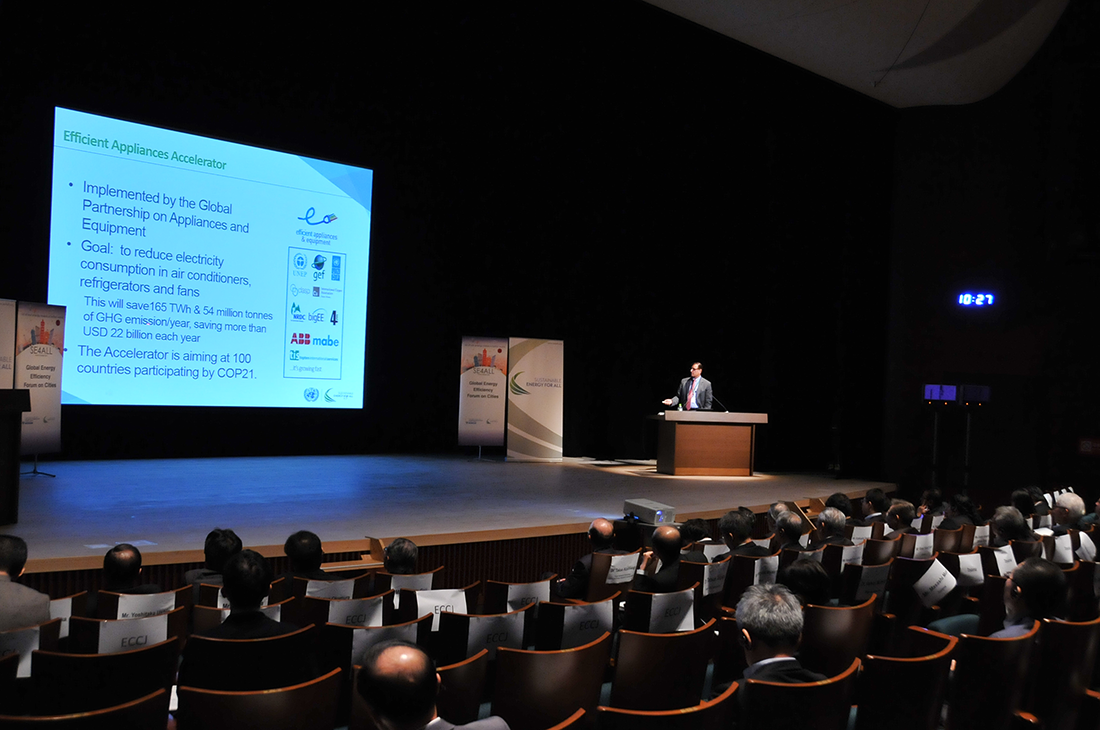
Shuzo Murakami (Institute for Building Environment and Energy Conservation)
Dr. Murakami gave a speech on “Energy Savings through Co-Evolution of Load Reduction and Quality Improvement in Buildings” . His speech covered the following three major issues.
Firstly, building sector accounts for 35% of the world energy consumption, and it is essential to promote energy conservation in the sector. Japan also has a high potential to reduce CO2 in the sector, which requires further energy conservation measures.
Secondly, introduction of ZEBs (Zero Energy Buildings) and PEBs (Positive Energy Buildings) would lead to establish innovative concepts in the energy conservation of buildings. Innovative technologies must be developed to realize ZEBs and PEBs, and they would be effective for not only the realization of energy conservation but also improvement of wellbeing where its values are resistant to obsolescence. It will be beneficial for the society as a whole, yield better returns, and results in improved values of buildings. Similarly, development of zero energy residences may promote better health in addition to energy conservation, through mainly improvement of their heat insulation performance. Japanese Ministry of Land, Infrastructure, Transport and Tourism has proposed to develop “Smart Wellness Houses” that contributes to achieving both environmental and social health.
Thirdly, there needs to be collaboration among academia, industry, and government to utilize advanced energy conservation technologies of Japan. “Ene Mane House (Energy Management House) Project” of METI (Ministry of Economy, Trade and Industry) aims at promoting ZEH or Zero Emission Houses by creating common benefits among academia, industry, and government.
Dr. Murakami concluded by saying that there was no limit to the methods for energy saving and quality improvement and that there should be a global initiative to attain this goal.
Takao Kashiwagi (International Research Center of Advanced Energy Systems for Sustainability, Tokyo Institute of Technology)
Dr. Kashiwagi spoke about the “Future Prospect of the Urban Smart Energy Infrastructure”. Following the great earthquake in 2011, various discussions were made all over Japan. As a result, an energy mix target was set in the middle of 2015. The Basic Energy Plan shows the importance of combined heat and power systems as an alternative to thermal and nuclear power generation.
Further, in response to deregulation in the energy sector, retail sale of electric power to residential sector will be liberalized. Accordingly, surplus of electric power generated in households exceeding self-consumption will be allowed to be sold in the market. Creation of such an electric power market will lead to establishment of a Smart Energy Network. Among the energy sources, combined heat and power systems using natural gas and propane as fuel will be serving a supply adjustment function in response to demand fluctuations.
Renewables with fluctuations in output are used in combination with a highly advanced control system, power storage system, etc. to create smart communities. These are connected to, for example, a Community Energy Management System (CEMS) via a state-of-the-art communication technology so that energy management in a certain area is allowed. A harmonic relationship between a large electric power system and a demand-side system can be attained by demand side revolution or collaboration between the advanced energy management systems. Dr. Kashiwagi also referred to large-scale international energy infrastructure using renewable energy resources such as photovoltaic, mega-solar, and wind power generation.
Mohinder Gulati (UN SE4All)
Mr. Gulati begins by talking about the three interlinked objectives of sustainable energy for all: energy access, energy efficiency facilitation, and renewables, where renewables were becoming more economically and technically feasible.
Further, the energy efficiency facilitation is a critical facilitator in achieving SDG (Sustainable Development Goals). Energy efficiency facilitation is beneficial as it increases productivity, lowers cost, creates jobs, and has huge environmental impacts and benefits. Multiple stakeholders need to come up with technology and policies to unlock this potential. Supporting improvement of energy efficiency facilitation measures has a positive effect both environmentally and socioeconomically.
To this end, an energy improvement facilitating accelerator that promotes the activities must be established, and motivation to commit to the accelerator is critical. For the commitment to the accelerator, national governments and local governments at various levels need to adopt at least one “energy efficiency facilitation” policy, to demonstrate that it is technically feasible and economically viable, in other words, that the energy efficiency facilitation is an attractive investment. International financial partners, including World Bank, would provide funding for policy development and demonstration projects. Such an approach can spread more awareness and acceptability among citizens and businesses, leading to their support toward achievement of the energy efficiency facilitation.
It is also important that various international organizations provide technical tools and database as well as their expertise to support national and local governments. In support of accelerators who are considering participation in the initiative, relevant agencies would design a roadmap in cooperation with administrative bodies at various levels and also give assistance to the follow-up on later. In view of the fact that the projects implemented by ECCJ have been internationally trusted, Mr. Gulati said that he was looking forward to the same level of contribution in the future.
According to him, if the lessons, experiences, expertise, and technologies from those activities are shared among those who are concerned with the SE4All initiatives and utilized for international projects, innovative guidelines, which accelerate the energy efficiency facilitation, would be created.
Session 1: City-led Policies for Buildings Energy Efficiency
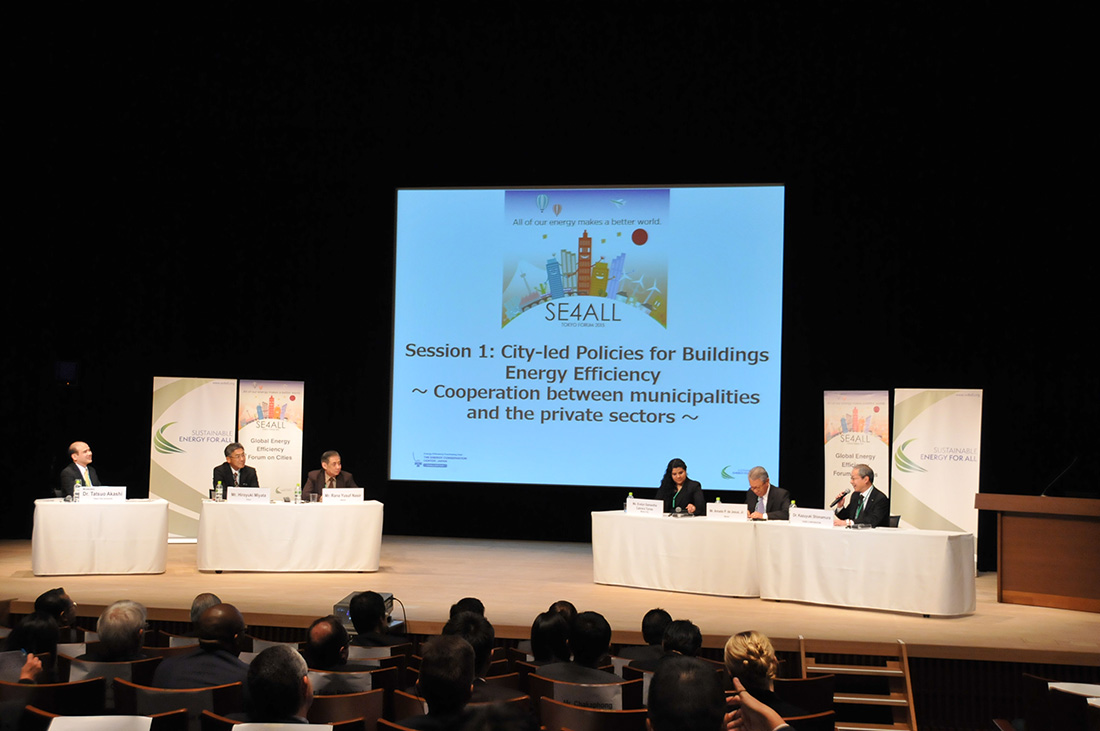
Overview of the presentations of speakers
Tatsuo Akashi (Tokyo City University)
Dr. Akashi said that, as high-performance energy conservation equipment and facilities for the achievement of the energy efficiency facilitation requires initial costs, official intervention is needed to promote investment in energy conservation activities of companies in private sector.
Hiroyuki Miyata (Tokyo Metropolitan Government)
Mr. Miyata pointed to the importance of reducing emissions from commercial buildings, which account for a major portion of the entire greenhouse gas emissions in Tokyo, and target for the emission reduction. He also reported, as a successful example of the measures taken to the reduction, description and achievement of the urban-type cap and trade (greenhouse gas emissions trading) system implemented in the building and industrial sectors in Tokyo.
Rana Yusuf Nasir (City of Jakarta)
Mr. Nasir made a speech on the accomplishment and importance of collaborative work between the local and national governments and between government and private sector, for expanding and promoting environmentally-friendly energy saving architecture (green buildings), as a part of the activities of Green Building Council which was established in 2008 involving Mr. Nasir as a founding member. For such collaborative work, he highlighted the necessity of human resource development designed to improve understanding by and raise awareness of persons concerned on green buildings.
Evelyn Samantha Cabrera Torres (City of Mexico City)
Ms. Torres talked about the sustainable building certification program, training for energy diagnostics, energy efficiency improvement of hospitals, etc., as energy conservation policies for buildings in Mexico City. Meanwhile, her speech covered incentives to companies contributing to energy conservation and project for replacing incandescent lamps with fluorescent lamps, as national government policies.
Amado P. de Jesus, Jr. (City of Manila)
Mr. Amado introduced the green building standard that was approved as an ordinance of Manila in 2014, as one of the efforts to solve energy issues caused by a substantial increase of commercial building constructions in Philippines. He highlighted that, to implement the local ordinance, human resource development to improve understanding by persons concerned on the green building standard is important.
Kazuyuki Shimamura (Taisei Corporation)
Dr. Shimamura presented the background of the ZEB (Zero Energy Buildings) development project promoted by TAISEI CORPORATION and outlined the state-of-the-art energy conservation and renewable energy equipment adopted in a model building in the project. He also explained the current situation of ZEB development in Japan as well as key technologies for its realization.
Summary of the session
To promote energy conservation in building sector and green buildings in cities, it is important to introduce highly efficient equipment and technologies and appropriate city planning practical for implementing the promotion. Further, ensuring thorough cooperation between municipalities and private sectors and involvement of all stakeholders in the planning and implementation is essential. Meanwhile, it is important to ensure that relevant steps are followed, focusing on the process. For further spread of energy conservation and green buildings, improvements in living activities and lifestyles of people who use the buildings is essential, in addition to introduction of excellent policies and technologies/equipment. To this end, raising consciousness and awareness of the public on the energy conservation is necessary. Human resource development, especially education of young people who will bear the future, is important.
Luncheon Talk
Masahiko Horie (Ambassador for Global Environmental Affairs, Ministry of Foreign Affairs of Japan)
Ambassador Horie mainly mentioned future roles of ECCJ, based on the history of energy efficiency activities in Japan. First of all, he noted that, Japan has achieved double GDP with the same level of energy consumption, in the past 40 years. As a result, energy consumption efficiency per GDP of Japan is 7 times higher than that of Russia and 5 times higher than that of China, he said. This means that, in the past 40 years, Japan made an economic growth with the highest energy efficiency in the world. As an example of the background information, the ambassador cited the Top Runner Program on which ECCJ has made great efforts with cooperation from METI. As one of the policies administered by METI, the program has been applied to about 30 types of equipment, including private motor vehicles, air conditioners, television sets, and printers. As a consequence of enforcing the system by law, competition among manufacturers was created and large energy conservation has been achieved.
The ambassador also noted another major role of ECCJ, where the center dispatches specialists to more than 1,000 companies and workplaces every year to demonstrate energy conservation diagnosis. Their technical advices in terms of promotion of energy management, reduction of energy consumption, or review on work styles have effective results. He said that he expected enhancing the ECCJ’s program would allow businesses in Japan, ranging from small and mid-sized companies to large enterprises, to work on energy conservation activities more effectively. He also added the importance of labeling, which is currently used by consumers as an index of how much cost reduction and saving can be achieved.
He also pointed to the efforts being made by more than 30 regions in Japan on development of “Compact City” in future, ecology, green, and low-carbon types, and the increasing importance of ZEBs (Zero Energy Buildings) on which TAISEI CORPORATION is currently focusing, utilization of renewable energy, and the like.
The ambassador concluded his speech, saying that he expected that ECCJ would bring Japanese know-how and technologies for improving energy efficiency to many countries around the world.
Kinya Okuyama (City of Kashiwa)
Mr. Okuyama said that the city of Kashiwa had been designated as a special district for energy conservation activities as well as “Future City” of government environmental initiative. Under the cooperation among the government, private sector, and academia, the Smart City Project was launched in the region called “Kashiwa-no-ha”. Further, three pillars (i.e. eco-city, new industry creation city, and healthy long-life city) were presented as a part of an urban development initiative aiming to solve social issues.
Yumiko Shimaoka
Ms. Shimaoka presented that new lifestyles have been established in “Kashiwa-no-ha” region. They are supported by effective use of energy, cooperation in the community, and utilization of state-of-the-art technologies for CO2 emissions reduction. Consequently, citizens of Kashiwa are allowed to use reserved power of the city along with regular electric power distributed by a power supplier. The reserved power comes from renewable energy and proper control of peak power, which could be seen as a good example of a possible solution to energy issues in Japan and overseas.
Tatsuo Arakawa (City of Utusnomiya)
Mr. Arakawa made a presentation on the urban development and district energy supply project of the city. Utusnomiya has been expanding the concept of the Compact City of network type, which responds to changes in social and economic situations, he explained. The concept aims at further development of the center area of the city by concentrating advanced city functions, such as commercial, cultural, and educational facilities. Another project under development is for connecting rural residential areas scattered in different regions and commercial facilities in the suburbs, through public transportation and/or LRT.
Some companies are also planning an electric power or thermal energy supply project, through which they aim to achieve the realization of a highly energy efficient city.
Session 2: Smarter Urban Transport Infrastructure
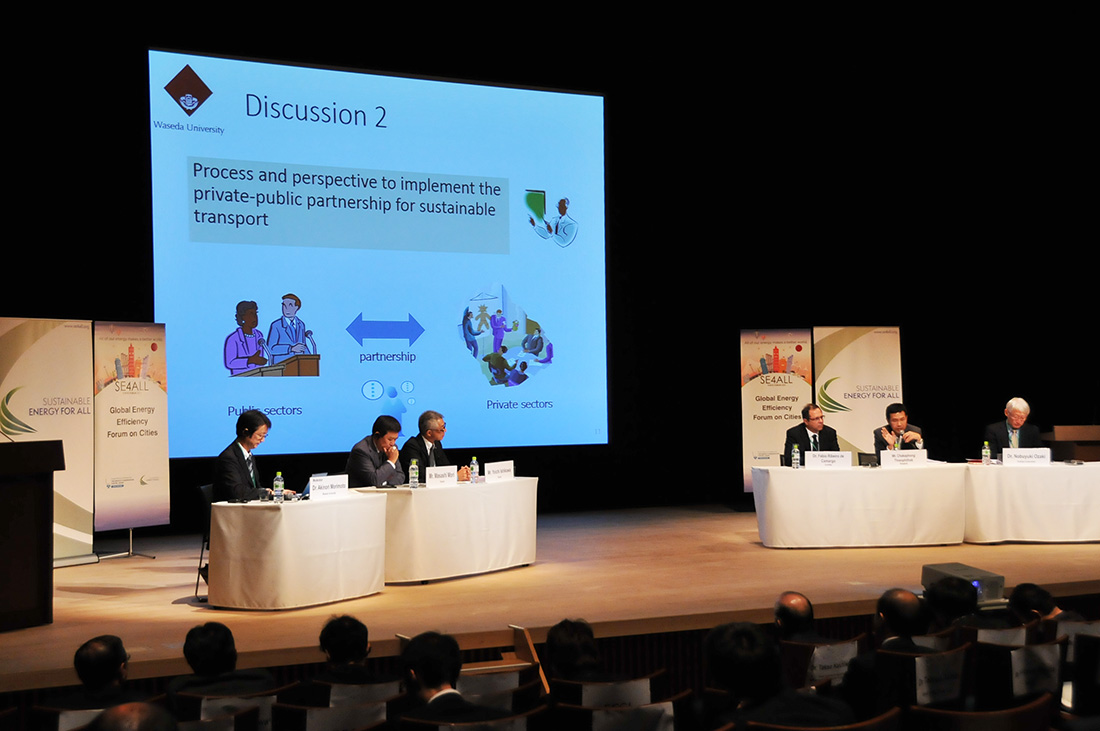
Overview of the presentations of speakers
Akinori Morimoto (Waseda University)
Dr. Morimoto covered a subject of the correlation between some issues in Japan such as a decrease in population and urban planning. He demonstrated that guidance to the Compact City was required to solve this problem, and taking advantage of new transportation system such as BRT and LRT would be effective. In addition, proper balance between motor vehicles and public transportation must be achieved for formation of a sustainable society.
Masashi Mori (City of Toyama)
Mr. Mori made a speech on the Compact City policy of Toyama, which includes reduction of greenhouse gas emissions, improved services for elderly people, LRT that contributes to mitigation of depopulation, and incentives to relocation to the areas around the LRT. The Compact City refers to a city where residents can have their daily activities within walking distance and, therefore, it is a city friendly to elderly people and environment. In view of these efforts, Toyama was selected not only by Japanese government as “Future City”, but also by OECD as a representative of the Compact City. Further, it was designated as an accelerator city for the UN SE4All initiative.
Yoichi Ishikawa (City of Toyota)
Mr. Ishikawa introduced the ITS Connect service which links, at the center of the city, to ultra-compact electric vehicles called “Ha:mo” and other next-generation motor vehicles with power generation function. The city is moving a new plan forward toward a more environmentally-friendly and disaster-resilient urban planning, he explained.
Fabio Camargo (City of Curitiba)
Dr. Camargo introduced the public transportation-oriented urban planning around BRT in Curitiba, which guides a hub of civil activities to move from the center of the city to the area around transportation terminals. He noted that the buses in the city have been replaced with hybrid electric buses in recent years and, consequently, emissions of particulate contaminants and greenhouse gases have been largely curbed. The city is also working on a green line project, he said, by introducing new lighting systems and communication monitoring systems to existing expressways and upgrading the equipment to smarter and more environmentally-friendly types.
Chakaphong Thienphithak (City of Bangkok)
Mr. Thienphithak talked about the efforts of Bangkok for improvements in its transportation systems, including, introduction of monorail vehicles, tramcar, BRTs, etc. and implementation of more information technology (IT) systems, such as adoption of countdown traffic lights to crosswalks.
Nobuyuki Ozaki (Toshiba Corporation)
Dr. Ozaki shared his view on the focus in urban transportation structure, from a technological perspective, and said that transportation and energy management are keys to formation of environmentally-friendly smart cities.
Summary of the session
Although there are many public transportation systems, their conditions and situations vary among different areas. Thus, it is essential to build consensus among citizens and people concerned, before introducing new public transportation system. Especially, when forming Compact City or Smart City as a form of sustainable cities, introduction of public transportation system (LRT, BRT, community vehicles, rental vehicles, etc.) under new ways of thinking is effective. However, development of relevant systems is very expensive. The keys to successful achievement of the goal are collaboration between the public administration and private sector, such as a public-private partnership (PPP), and enhancement of cooperation. In addition, strong leadership in public sector would also encourage the project to be implemented. Meanwhile, in local cities with poorly developed public transportation, a long-term strategy involving land utilization while balancing next-generation motor vehicles and public transportation systems is required.
Session 3: Optimization of the District Energy System
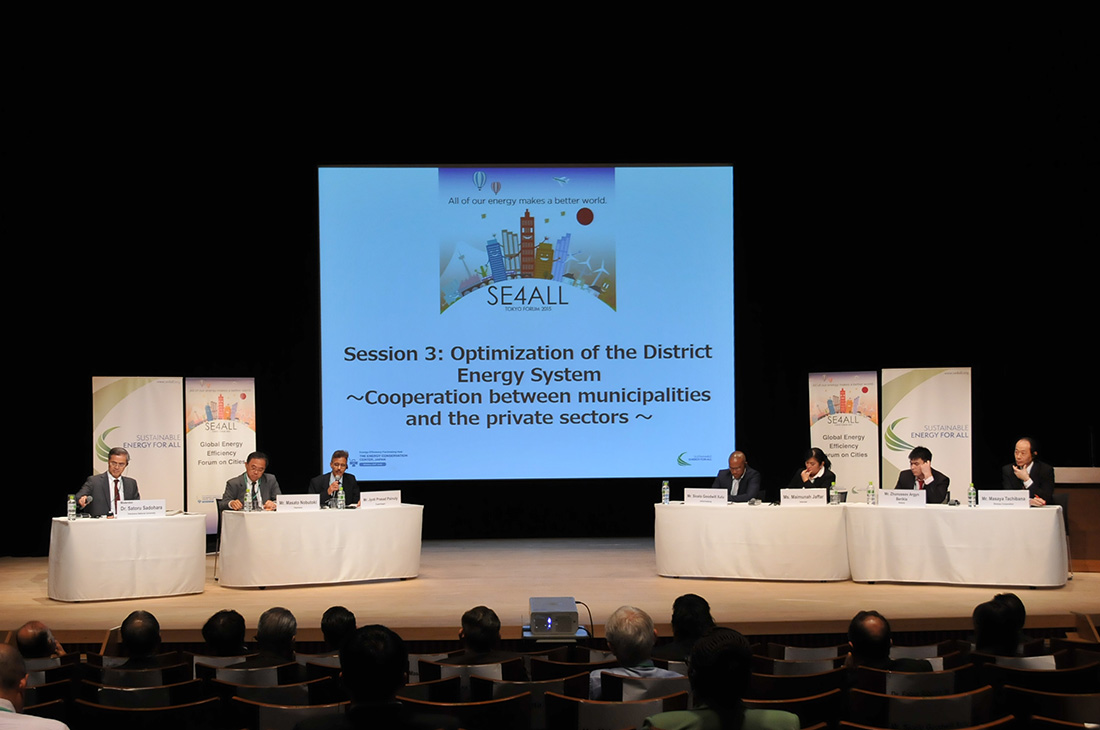
Overview of the presentations of speakers
Zhunussov Argyn Berikla (City of Astana)
Mr. Zhunussov explained some improvements of energy efficiency lead by the government as well as regulation of thermal losses and energy conservation measures in power supply. Astana is focusing on the environmental and social benefits that will be produced by the reduction of greenhouse gas emissions. He said that future energy issues would be the main topic for the Energy Expo to be held in 2017 in the city.
Masaya Tachibana (Shimizu Corporation)
Mr. Tachibana presented a core project of Shimizu Corporation called “ecoBCP”. He also introduced new headquarter building of the company that would to be a hub in the Kyobashi Smart Community initiative, adding that it would not only have superior energy conservation performance but also take a role of disaster-prevention facility in the community.
Sicelo Xulu (City of Johannesburg)
Mr. Xulu explained current situations and challenges in relation to energy supply and its allocation, the issues currently faced by Johannesburg, which is one of the economic centers in South Africa.
Maimunah Jaffar (Iskandar Regional Development Authority)
Ms. Jaffar described practical application of energy measures in Iskandar Malaysia, and mentioned that it was very favorable that all the activities and plans were lead by the nation and government. Currently, 80% of infrastructure development has been completed by companies in private sector supported by the government. For further advancement of the project, she said, human resource development must be enhanced.
Masato Nobutoki (City of Yokohama)
Mr. Nobutoki described a unique urban planning approach of Yokohama. According to him, through history, people recognize the importance of resilience and, additionally, “resilience in energy supply” as an indispensable aspect recently. The city has regional energy management in place, where renewable energy and battery are combined. Mr. Nobutoki said it is important for citizens to be involved in the promotion of such a project.
Jyoti Prasad Painuly (City of Copenhagen)
Mr. Painuly made a speech covering many successful strategies proven in Copenhagen, which is regarded as one of the most ecological cities in the world. He said all of green buildings, green mobility, energy conservation strategies, district heating project, etc. were achieved due to strong leadership of the government.
Satoru Sadohara (Yokohama National University)
Dr. Sadohara said that energy situations were varying substantially among nations and cities. Local energy projects need to be developed in consideration of the effect of energy detailers and associated added values, he said. Putting the projects into practice would require raising awareness of the public and participation by the citizens, so that the optimal management scheme can be selected among a wide variety of schemes. To this end, cooperation among people concerned and sharing of information among them were very important, he added.
Summary of the session
For promoting a district energy project including electric power and/or thermal energy issues, strong leadership of a local government based on a proper vision is required. In terms of the cost for the project, as a substantial initial cost for installing relevant equipment is expected, an early phase has more significance. Further, both incentives and regulation (“carrot and stick”) are important to involve companies in private sector. Sharing common awareness of the issues with residents including young people is the key to a successful project. Following the Great East Japan Earthquake, securing energy became the largest concern in Japan. Many local governments are trying to establish a practical system for energy accumulation, which is effective both in time of emergency and in normal times. Further, Improvement of self-sustainability and distribution of energy sources as well as sharing of energy among all persons concerned including consumers and suppliers connected by information have been promoted. Efforts among those concerned toward co-creation of the project while sharing such experiences are essential.
Session 4: Way Forward for the Promotion of Energy Efficiency in the Expanded City Areas
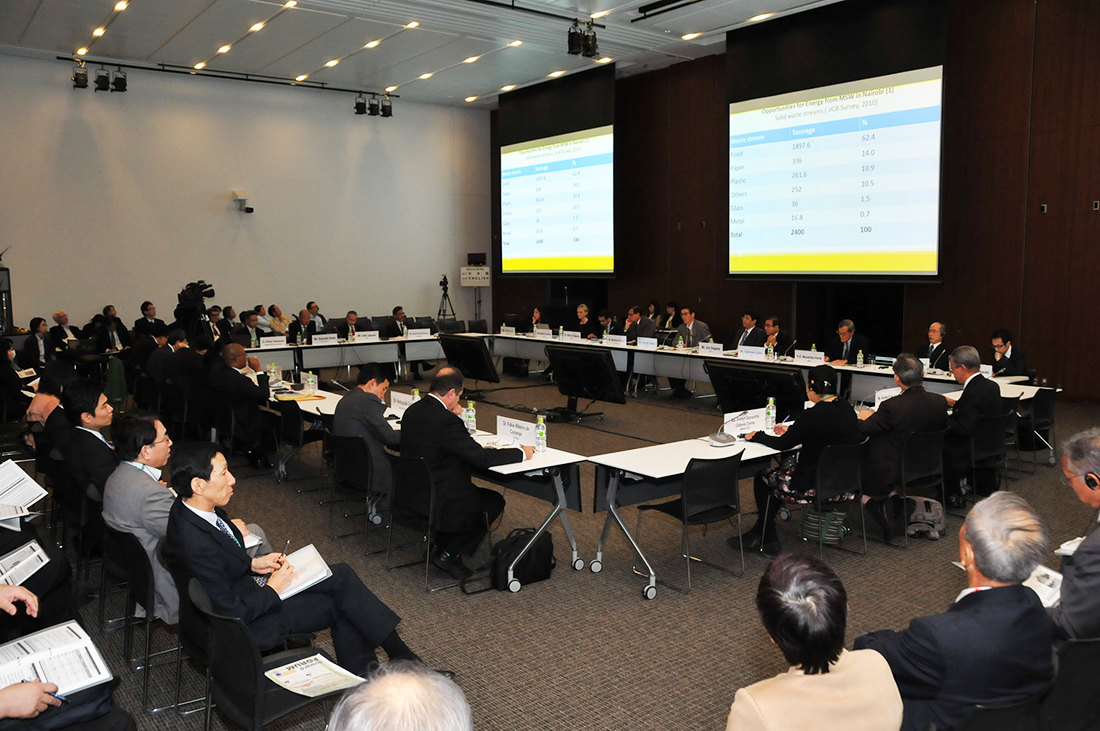
Overview of the presentations of speakers
Narumi Nakamoto (City of Kitakyushu)
Ms. Nakamoto talked about the efforts made by Kitakyushu, which was founded as an industrial town and later damaged by pollution issues. Using the hydrogen produced as a by-product in ironworks in the city as an energy source, the city has placed a variety of measures for energy conservation. Consequently, it currently takes the international leadership in solving industrial pollution issues in Asian countries and in the field of promoting green projects, etc.
Nguyen Minh An (City of Hanoi)
Mr. Nguyen described the issues faced by Hanoi, mostly in construction sites. Challenges for the city are the reduction of energy use, standardization in relation to energy management and promotion of green projects, and enhancement of expertise and skills in the energy field. To resolve these issues, sharing of knowledge and information, including relevant trainings, is important.
Leah Oyake-Ombis (City of Nairobi)
Dr. Oyake-Ombis explained the challenged faced by Nairobi in the field of energy. The city has placed a new measure for improving energy conservation; however, the public awareness still remains at a low level. To enhance its green programs, further human resource development and improvement of understanding by citizens would be required, she noted.
Shinji Yamamura (Nikken Sekkei Research Institute)
Dr. Yamamura presented the progress of energy conservation projects in some cities contributed by Nikken Sekkei Research Institute. Advancement of urbanization results in a population growth, which directly relates to energy issues, and formation of a smart city involving proper buildings and transportation is important to solve such issues. From such a viewpoint, the scheme of public transportation-oriented urban development would be effective, he said.
Kazuaki Ikeda (IBM Japan)
Mr. Ikeda explained various effects of ICT on energy utilization. The Smart Grid Maturity Model developed by IBM, in cooperation with other organizations, would allow us to evaluate maturity of a project and would be quite helpful to advance the project, he said. Further, he mentioned that effective use of information through improved networks among regions and businesses would be important.
Ivan Jaques (World Bank)
Mr. Jaques started with an estimated fund required to achieve the world’s energy conservation goals, and explained financial means for promoting projects, such as finance loans applicable to operating fund of the projects, special credit lines for energy conservation, and risk allocation funds.
Jyoti Prasad Painuly (Copenhagen Center on Energy Efficiency)
Mr. Painuly mentioned that SE4All had been playing a significant role in the management of the global platform for promoting energy conservation, through three critical programs. In the platform, SE4All found ECCJ as an organization leading ”technical and analytical support” in collaboration with C2E2 serving as a planner/coordinator, he said.
Minoru Takada (SE4All New York)
Dr. Takada explained, as a head of SE4All New York, major aspects of the activities of the SE4All initiative, such as capacity building and financing for promotion of energy projects. Further, he said that SE4All is poised to launch full-scale efforts for any cases anywhere in the world, as far as there are needed.
Yoshitaka Ushio (The Energy Conservation Center, Japan)
Mr. Ushio outlined the history of ECCJ and presented various projects implemented by ECCJ, including human resource development consist of dispatching specialists and providing initial training, teaching energy-conservation technologies, and giving advices on the administration side. The AJEEP Program, ASEAN Energy Award, JICA-ECCJ Worldwide Group Training Program were also mentioned as good examples of its activities. Further, he pointed to the following three objectives for its future activities.
- Taking advantage of position as an EEF hub for SE4All, ECCJ will advance the EE&C project more practically and usefully.
- In light of the lessons learned from the SE4All Forum, ECCJ will work on establishment of closer cooperation among cities and on further additional support to energy conservation projects carried out by various levels of local governments, in addition to conventional work on a national basis.
- For the success of the SE4All initiative, ECCJ will work on closer cooperation with various departments of Japanese government, various sections related to SE4All, and all people concerned in private businesses and academia.
Masayuki Dewaki (METI)
Mr. Dewaki noted that he had learned 4 important lessons, through the two-day sessions, for promotion of energy conservation in cities. They are:
- strong leadership at a top-management level;
- establishment of policy infrastructure that encourages a network and coordination among policymakers in local governments, specialists, and companies in private sector;
- improvement of policymaking capability of policymakers in local governments; and
- sharing of information, among working-level officials in local governments, on the insights gained through performance of their services and on their experiences.
He also mentioned the excellent practical knowledge and a wide network of ECCJ, adding that METI will continue to support ECCJ serving as a hub for SE4All.
Summary of the session
It is necessary for every city to design proper policies, depending on what phase it has reached in the roadmap toward the final target in the energy conservation activities. In order for the city to implement the policies, collaboration with the national government, cooperation of manufacturers in providing their state-of-the-art technologies, financial assistant measures, etc. are essential requirements. Every hub under the initiative of the energy efficiency accelerator platform should have a unique function, and collaboration among hubs taking advantage of their different features should be promoted to meet the needs of various cities which are facing challenges. The SE4All initiative will enhance global cooperation, for more effective promotion of energy conservation, among national governments, cities, NGOs, companies in private sector, financial community, academia, research institutions, and citizens.
Challenges and measures for the future, in light of the achievements of the Forum
Achievements of the Forum
(1) As a result of inviting excellent speakers from Japan and overseas and holding active discussions on various issues, the Forum could draw some effective conclusions worthy of having held an international convention in Japan. Consequently, the Forum served as an ideal opportunity for Japan to demonstrate its technological capabilities to the world as well as for Japanese participants to get to know various situations in overseas counties.
(2) What are sought by the SE4All initiative could be reaffirmed. According to Mr. Gulati, COO of SE4All, what it expects to its hubs are:
- providing support for the entity aiming to overcome energy efficiency challenges in identifying its problems and developing a roadmap/action plan toward solving the problems; and
- providing practical support toward implementation of the roadmap/action plan.
The above two points are substantially in line with the framework of activities for human resource development projects ECCJ have been providing. However, additional efforts toward new themes such as city energy issues and expansion of scope of our activities to include, for example, the energy efficiency accelerator cities for SE4All are needed.
(3) ECCJ was recognized for its performance and significance on the stage of SE4All administered by United Nations and, accordingly, the center has established a firm position as an Energy Efficiency Facilitating Hub for According to Mr. Gulati, ECCJ has proven that, “during the Forum, it has technical expertise in energy conservation at a global level and is able to bring good outcome to other cities and countries through dispatching its specialists”.
(4) It was confirmed that organizations concerning the SE4all Initiative would work on closer cooperation and allocation of roles. ECCJ was given a role of an organization that provides technical and analytical support in the field of energy efficiency improvement for the EE Accelerator Platform.
Awareness of the challenges current faced
(1) As a result of the success in the Forum, ECCJ could make the SE4All personnel concerned and the participants from the world understand the ECCJ’s performance in the activities developed mainly in Asian counties. Consequently, the center has built a certain position in the SE4All To take advantage of this asset in the future, the center needs to gain larger presence in the SE4All activities and, accordingly, the way of gaining it must be discussed.
(2) As has been revealed in the Forum, it is necessary to overcome the following challenges to achieve successful energy efficiency projects for cities. What supports would be possibly provided against the challenges must be discussed. With respect to financial assistance measures to implement energy conservation projects, only pointing to the targets to be achieved were heard during the Forum. This should be the agenda for future meetings.
- Ensuring strong leadership by national and local governments
- Promotion of cooperation between municipalities and private sectors and ensuring civil participation
- Sufficient information sharing, on the subject of diversities in various projects, among those concerned in governments, industry, and academia
- Promotion of human resource development in both public and private sectors, and enhancing understanding of general public, in particular, by taking actions focusing on young people who will bear the future
(3) Specific measures
a. Challenge: “ensuring strong leadership by national and local governments” – Actions to be taken-
- To allow national and local governments to exercise strong leadership, ECCJ will provide support in designing a roadmap toward energy efficiency improvement and follow-up on it, as well as human resource development for achieving the roadmap.
- As a plan for 2016, holding a workshop, with invited specialists on urban issues, in Japan should be discussed. In the workshop, introduction of superior examples of activities in Japan will be made, along with creating a roadmap through small group activities and a site visit, aiming to accomplish more practical achievements. Further, for the purpose of having more advanced discussions, more focused theme will be chosen (for example, “energy conservation of buildings”). Invitation will be sent to mainly Asian countries, and participants from the SE4All accelerator cities will also be considered. Participation by the cities in Japan that backs organizations related to SE4All and smart community initiative will also be requested.
b. Challenge: “promotion of cooperation between municipalities and private sectors and ensuring civil participation” – Actions to be taken
- During the workshop in Japan described above, how the cooperation between municipalities and private sectors should be managed and how citizens should be participating the initiative shall be discussed. To demonstrate the examples in Japan as a reference, specialists from the cities in Japan that backs the smart community initiatives (mainly the cities participated to the Tokyo Forum) should be invited to have them involved in the discussions. Further, to feed the discussions into actual projects, interaction through JASE-World among the invited cities from overseas and private businesses will also be facilitated.
c. Challenge: “information sharing of diversified project information, among those concerned in governments, industry, and academia” – Actions to be taken
- To collect and send the information on various projects in the world, a network of organizations related to the SE4All initiative should be built.
- With the objectives of collecting the above-described information and contribution to global SE4All activities, ECCJ will actively dispatch its specialists to the workshops and forums hosted by organizations and hubs under the SE4All initiatives. (In 2016, dispatching the specialist to 3 events is to be considered.)
- ECCJ itself will hold local workshops (e.g., co-hosted by Indonesia), as an Energy Efficiency Facilitation Hub, aiming to provide energy conservation measures through diagnoses in actual sites and formation of energy conservation projects. In addition, involvement of JASE-World in the formation of the project will also be considered.
d. Challenge: “Promotion of human resource development in both public and private sectors, and enhancing understanding of general public, in particular, by taking actions focusing on young people who will bear the future” – Actions to be taken
- Through the local workshops and those in Japan, ECCJ will work on enhancement of human resource development for mainly policymakers. Meanwhile, the center will provide support in designing a roadmap toward more participation by general public and enhancement of their understanding, as well as follow up on the relevant activities.
Final comments -What should be noted as a hub for SE4All
More profound and expanded activities as ECCJ
- In addition to conventional policies for its activities, ECCJ should work on further enhancement and improvement of conventional activities in the areas of capacity building and awareness raising, in light of the expectations of SE4All, as well as on promoting international development of energy conservation projects, not only in Asia but also in a wider global level.
- Meanwhile, closer cooperation with internal organizations of SE4All, including its hubs (C2E2, ADB, WB, etc.) should be sought to improve the abilities of ECCJ itself.
Raising the level of activities of SE4All itself
- EE Accelerator Platform consists of accelerators in 8 fields (i.e., improvement of fuel efficiency for motor vehicles, improvement of light efficiency, improvement of efficiency of electric appliances, district energy system, buildings, industry, power generation, and financing)
- Supporting sectors (financial support, commercialization efforts, planning and coordination, and technical and analytical support) are located around the 8 fields. ECCJ has been designated to take a role in the technical and analytical support, in collaboration with C2E2.
- Taking advantages of the position ECCJ has gained in the SE4All initiative, the center will seek for the maximum effect of its role as a member of the platform, for the benefit of all participants, and prospective customers. In other words, utilizing the synergy or risk reduction effects gained by enhanced cooperation with similar organizations, ECCJ will contribute to more active management and enhanced sustainability of the SE4All initiative.
At the closing of this report, ECCJ intends to work on the future activities under the guidance of METI, as before, and take actions necessary for expansion of the SE4All activities through necessary information exchange with related ministries and agencies.
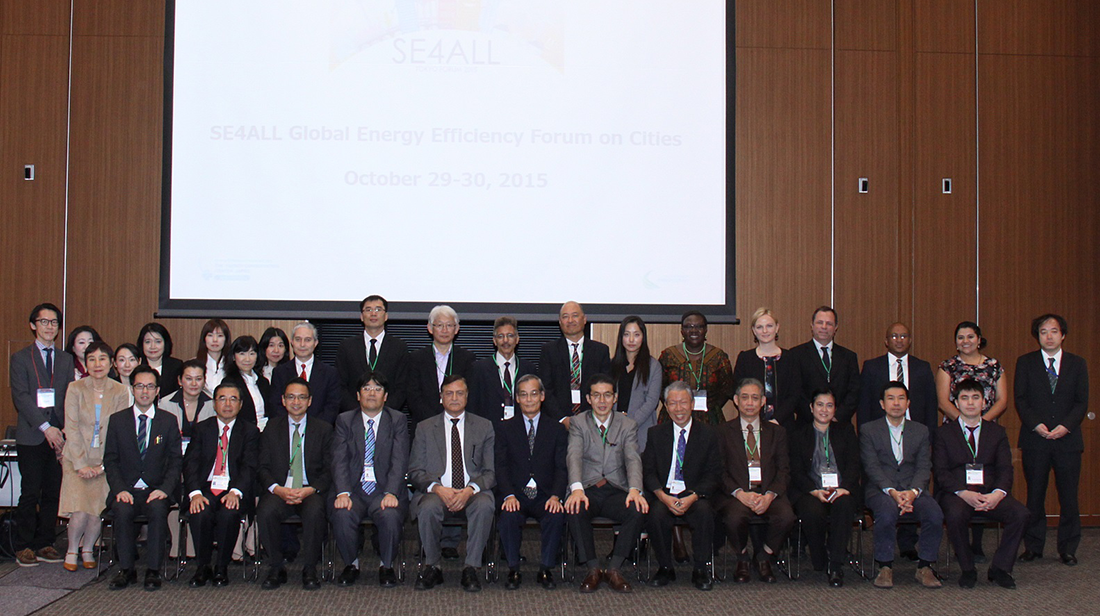
Day 1: Thursday, 29 October
9:00—9:20
Opening comments (MC)
Opening remarks
・Toshimitsu Fujiki, Energy Conservation and Renewable Energy Dept. Agency for Natural Resources and Energy Director General
・Mohinder Gluti, SE4All United Nations Secretary-General Special Representative
・Yosaku Fuji, Chairman, Energy Conservation Center, Japan (ECCJ)
9:20—9:45
Keynote lecture: Energy-Savings through Co-evolution of Load-reduction and Quality-improvement in Buildings
・Shuzo Murakami, Professor Emeritus, University of Tokyo; President, IBEC (Institute for Building Environment and Energy Conservation)
9:45—10:10
Keynote lecture: Future prospect of urban smart energy infrastructure
・Takao Kashiwagi, Specially Appointed Professor, Tokyo Institute of Technology; President, Cogeneration Foundation (Advanced Cogeneration and Energy Utilization Center)
10:10—10:30
Keynote lecture: SE4All ― Energy Efficiency work: current status and future directions
・Mohinder Gluti, SE4All United Nations Secretary-General Special Representative
10:30—11:00
Coffee break
11:00—12:30
Session 1: City-led Policies for Buildings Energy Efficiency
~ Cooperation between municipalities and the private sectors ~
Moderator: Tatsuo Akashi, Professor, Tokyo City University
12:30—14:00
Lancheon talk
1) Who is ECCJ? What they do?
H.E. Masahiko Horie, Special Assistant to the Minister for Foreign Affairs of Japan and Ambassador for Global Environmental Affairs
2) 2 types of models of the smart cities in Japan (Kashiwa and Utsunomiya)
Ms. Yumiko Shimaoka, Environmental Department Environmental Policy Division, Kashiwa
Mr. Tatsuo Arakawa, Vice Mayor, Utsunomiya
14:00—15:30
Session 2: Smarter Urban Transport Infrastructure
~ Looking toward compact cities ~
Moderator: Akinori Morimoto, Professor, Waseda University Faculty of
Science and Engineering
15:30—16:00
Coffee break
16:00—17:30
Session 3: Optimization of the District Energy System
~Cooperation between municipalities and the private sectors~
Moderator: Satoru Sadohara, Professor, Yokohama National University
18:00—20:00
Reception
Day 2: Friday, October 30
9:00—11:00
Session 4: Way Forward for the Promotion of Energy Efficiency in the Expanded City Areas
Moderator: Yasushi Tanaka, General Manager, The Energy Conservation Center, Japan (ECCJ)
11:00—11:15
Closing session and Closing remark
Mr. Jiro Sogawa, Managing Director, The Energy Conservation Center, Japan (ECCJ)
11:15—12:30
Lunch break
12:30—17:00
Site visits
List of Speakers and Panelists
Opening
Name
Organization (City)
Position
Mr.Toshimitsu Fujiki
Ministry of Economy, Trade and Industry
Director-General, Energy Conversation and Renewable Energy Department
Mr.Mohinder Gulati
SE4ALL
Chief Operating Officer
Mr.Yosaku Fuji
The Energy Conservation Center, Japan (ECCJ)
Chairman
Dr.Shuzo Murakami
The University of Tokyo / Institute for Building Environment and Energy Conservation
Professor Emeritus, The University of Tokyo / President, Institute for Building Environment and Energy Conservation
Dr.Takao Kashiwagi
Tokyo Institute of Technology / Advanced Energy Systems for Sustainability (AES)
Tokyo Institute of Technology Distinguished Professor / Center Director of AES
Session 1
Name
Organization (City)
Position
Dr.Tatsuo Akashi
Tokyo City University
Professor
Mr.Hiroyuki Miyata
Tokyo
Director, Emissions Trading, Climate Change & Energy Division, Bureau of Environment
Mr.Amado P. de Jesus,Jr.
Manila
CEO &President, Philippine Green Building Initiative (PGBI)
Mr.Rana Yusuf Nasir
Jakarta
Board of Governance, American Society of Heating, Refrigerating and Air Conditioning (ASHRAE) Indonesia chapter
Ms.Evelyn Samantha
Cabrera Torres
Mexico City
Investigator, Urban Land and Environment Attorney`s Office from Mexico City
Dr.Kazuyuki Shimamura
TAISEI CORPORATION
Executive Fellow / Deputy General Manager, Environment Div.
Luncheon talk
Name
Organization (City)
Position
Mr.Masahiko Horie
Minister for Foreign Affairs
Special Assistant to the Minister for Foreign Affairs of Japan / Ambassador for Global Environmental Affairs
Ms.Yumiko Shimaoka
Kashiwa
Environmental Department
Environmental Policy Division
Mr.Tatsuo Arakawa
Utsunomiya
Vice Mayor
Session 2
Name
Organization (City)
Position
Dr.Akinori Morimoto
Waseda University
Professor, Faculty of Science and Engineering
Mr.Masashi Mori
Toyama
Mayor
Mr.Yoichi Ishikawa
Toyota
Manager, Management Strategy Bureau
Dr.Fabio Ribeiro de Camargo
Curitiba
Director of Public Lighting
Mr.Chakaphong Thienphithak
Bangkok
Civil Engineer Traffic and Transportation Department
Dr.Nobuyuki Ozaki
Toshiba Corporation
Senior Fellow, Railway&Automotive Systems Div.
Session 3
Name
Organization (City)
Position
Dr.Satoru Sadohara
Yokohama National University
Dean / Professor, Institute of Urban Innovation
Mr.Masato Nobutoki
Yokohama
Executive Director, Future City Promotion Climate Change Policy HQ
Mr.Jyoti Prasad Painuly
Copenhagen
Head, Copenhagen Centre on Energy Efficiency
(C2E2)
Ms.Maimunah Jaffar
Iskandar
Head of Planning & Compliance Divison
Iskandar Regional Development Authority (IRDA)
Mr.Sicelo Goodwill Xulu
Johannesburg
Managing Director, City Power Johannesburg SOC Ltd,
Mr.Zhunussov Argyn Berikla
Astana
Leader Energy Supply Department
Mr.Masaya Tachibana
Shimizu Corporation
General Manager, ecoBCP Business Promotion Division
Session 4
Name
Organization (City)
Position
Mr.Yasushi Tanaka
The Enegry Conservation Center, Japan (ECCJ)
General Manager
Mr.Narumi Nakamoto
Kitakyushu
Executive Director,Future City Promotion Department Environment Bureau
Mr.Hoang Minh Lam
Hanoi
ViceDirector, Energy Conversation Center of Hanoi (ECC Hanoi)
Dr.Leah Oyake-Ombis (Ms.)
Nairobi
Chief Officer, Environment & Forestry Nairobi City County-Kenya
Dr.Shinji Yamamura
NIKKEN SEKKEI Research Institute
Executive General Manager
Principal Consultant
Mr.Kazuaki Ikeda
IBM Japan, Ltd.
Business Development Executive, Infrastructure Service Global Technology Services
Mr.Ivan Jaques
World Bank
Senior Energy Specialist,
Energy Sector Management Assistance Program
Dr.Minoru Takada
SE4ALL
Representative and Director, New York Office
Mr.Jyoti Prasad Painuly
Copenhagen Centre on
Energy Efficiency (C2E2)
Head
Mr.Yoshitaka Ushio
The Energy Conservation Center, Japan (ECCJ)
Senior Advisor
Mr.Masayuki Dewaki
Ministry of Economy, Trade and Industry
Senior Assistant Director, International Affairs Office, Energy Conversation and Renewable Energy Dept., Agency for Natural Resources and Energy
Ms.Monika Froehler
SE4ALL
Energy Efficiency Programme and Communication officer
Ms.Jinsun Lim
SE4ALL
Junior Professional Associate
Closing session
Name
Organization (City)
Position
Mr.Jiro Sogawa
The Energy Conservation Center, Japan (ECCJ)
Managing Director
※Please click on the text to see the presentation materials.
Luncheon Talk
1.Ministry of Foreign Affairs 2.Kashiwa 3. Utsunomiya
Session 2
1.Akinori Morimoto 2.Toyama 3.Toyota 4. Curitiba 5. Bangkok 6. Toshiba Corporation
Session 3
1.Yokohama 2.Copenhagen 3.Johannesburg 4. Iskandar 5. Astana 6. Shimizu Corporation
Session 4
1.Yasushi Tanaka(ECCJ) 2.Kitakyushu 3.Hanoi 4. Nairobi 5. NikkenSekkei 6. IBM Japan 7.World Bank
8. C2E2 9. Yoshitaka Ushio(ECCJ)
Closing Session

